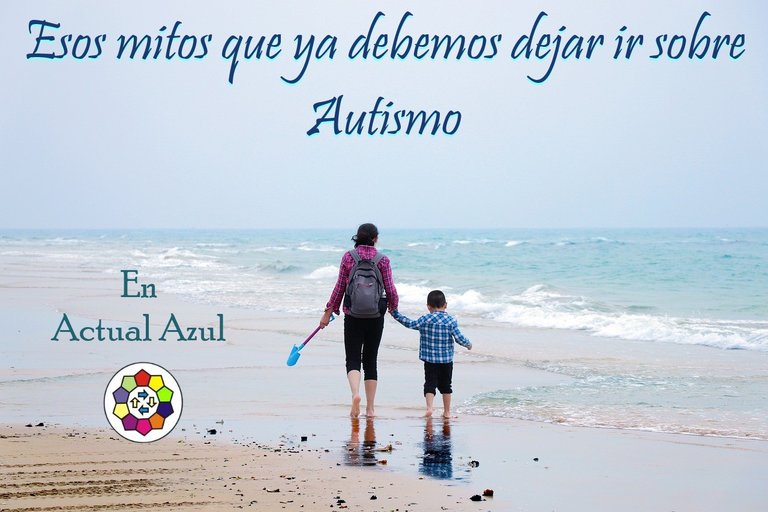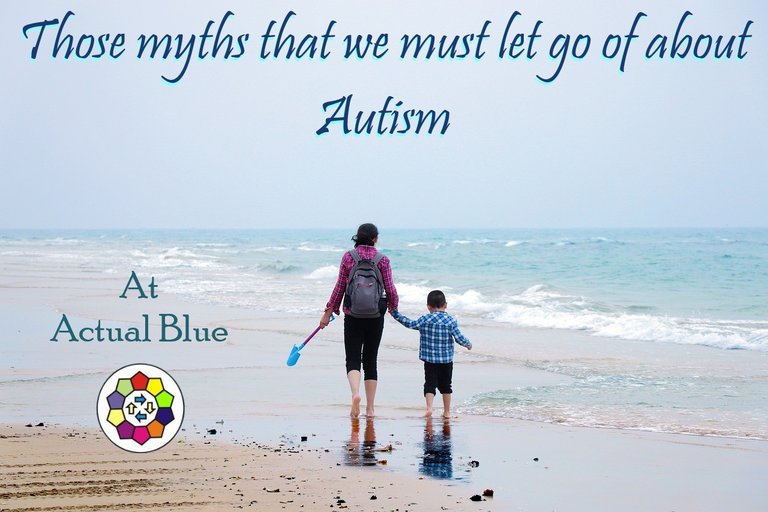

¡Cómo cambian las cosas!
En mis tiempos -no hace tanto-, un jovencito que solo hablaba con los amigos a través de un teclado sería considerado, con seguridad, un discapacitado, imposibilitado para tener relaciones sociales; pero, hoy en día, eso es tan normal…
Lo mismo sucede con el diagnóstico de autismo, que no todos sabemos lo que es y lo único que conocemos es que son personas diferentes, con ciertas dificultades para interrelacionarse con los demás y con su entorno.
Pero existen mitos que se han construido sobre el autismo, que ha sido muy difícil de erradicar, por lo que seguimos viendo en ellos a discapacitados, que hasta cierto punto lo son, y como una rareza que se discrimina.
Veamos aquí algunas reflexiones sobre formas de ver a los pacientes con Trastornos del Espectro Autista que, para mí, ya deberían haber desaparecido.


Desde la historia, hasta las vacunas como causas
Comprender sobre el autismo nos ha costado.
Desde la historia misma de la condición, hemos cometido errores; ya, el mismo psiquiatra Leo Kanner (1896-1981), un psiquiatra infantil que logró diferenciar los síntomas de autismo de los de la esquizofrenia, les atribuyó la culpa a los padres por no haberles ofrecido amor y cuidados adecuados.
Bueno, no voy a hablar aquí de la historia; sin embargo, les voy a pedir que revisen el artículo de Steve Silberman, del 20 de octubre del 2015: Cuatro mitos sobre el autismo que se niegan a desaparecer, en el blog de la BBC Mundo, noticias.
Este artículo nos explica por qué hay más diagnósticos de autismo hoy en día, y a desechar mitos o creencias que tenemos sobre ellos, de que no tienen empatía y sobre la idea de que el tratamiento va dirigido a hacerlos indistinguibles de los otros.
Pero, sí hay otros mitos que se unen a estos que deberíamos tomar en cuenta, no solo para que entendamos más esta condición, sino también, para que nos revisemos como seres humanos y comprendamos que muchas de las creencias que tenemos culturalmente, debemos irlas desechando con trabajos de investigación y aprendiendo sobre la vida y la realidad cultural que vivimos.

Lo que he escuchado decir...
Sí, es curable con medicinas y fisioterapia
No voy a decir nada sobre el tratamiento o la medicación, pero el autismo es un síndrome clínico; es decir, un conjunto de síntomas que caracterizan una condición; no es una enfermedad incurable o curable.
Es cierto que hay sintomatología que les ocasiona daño, por lo que necesitan tratamientos, pero no tiene nada que ver con la definición de la condición en sí.
Creo que la causa es hereditaria o una mala reacción a una vacuna
Esto, al igual que los mitos que nos expone Silberman (2015), en su artículo referido anteriormente, son concepciones que siguen dando de qué hablar.
Por un lado, se le achaca a la Vacuna Triple Viral la causa; y la gente opta por no vacunar a sus hijos; pero esta vacuna no tiene nada que ver con las consecuencias del mercurio en la sangre.
Se ha alegado una neurotoxicidad producto de un derivado del Mercurio que no tiene la vacuna.
Y, por otro lado, no es hereditaria, no hay una etiología concreta, aunque hay mutaciones que hoy en día están saliendo a la luz, pero está en estudio.
En las películas siempre los pintan como unos superdotados...
Algo que van a escuchar mucho: ¡Es superdotado!
Y debo decirlo como médico, que a veces creo que es una forma que tienen los familiares de alivianar la concepción que tienen sobre esta condición, un mecanismo de defensa.
Se habla de que son genios, y nos pintan a estos niños en el cine y en la televisión como superdotados.
Si existen casos notables que han dado lugar a ejemplos que se personifican en una película, sin embargo, la realidad es que no se les toma como personas talentosas, sino, todo lo contrario.
Ellos tienen habilidades, frecuentemente documentadas, como la ejecución de operaciones matemáticas mentales, la identificación de notas musicales en patrones, y otras más, que están relacionadas con el desarrollo de ciertas áreas cerebrales.
Pero es una sola realidad, y es que, como cualquier niño, ellos deben ser educados en la escuela y en el hogar para todo lo que se debe educar a un niño.

Ahora hablamos más abiertamente
Lo cierto es que, hoy en día, la capacidad que tenemos los médicos de diagnosticar esta condición es mayor; por lo tanto, pareciera que existen más casos.
Igualmente, ya no nos escondemos, ni como familia ni como profesionales, para hablar de esta discapacidad social que trae consigo tantos problemas para la familia, incluso, sabemos que la ansiedad, la depresión, la sensación de no saber qué hacer, que muchas veces viven todas las familias que tienen hijos dentro del espectro autista, debe ser aceptada y entendida.
Esto también es una forma de atacar esa presión social sobre los padres, de que deben estar agradecidos por tener un hijo con este desafío en el hogar.
Lo cual no es verdad; los padres sufren trastornos de adaptación ante esta realidad de vida, que deben respetarse.
Pero es un desafío, como muchos otros en la vida, que les toca a tantas familias.
Por eso, ante un padre ansioso o cansado, debemos ser empáticos; y ellos tienen que aprender a ser resilientes, pues, no les queda de otra y no es fácil.
Con esto, en ocasiones, también van a sufrir de depresión, de estrés, de soledad o aislamiento social como familia.
Y lo importante es que dejemos de asumir verdades ante una condición que apenas está en estudio.


We debunk myths we won't let go of about Autism! -And We Evaluate Cultural Attachments- In Actual Blue


How things have changed!
In my time -not so long ago-, a young boy who only talked to his friends through a keyboard, would surely be considered disabled, unable to have social relationships; but, nowadays, that is so normal...
The same happens with the diagnosis of autism, which we do not all know what it is and the only thing we know is that they are different people, with certain difficulties to interrelate with others and with their environment.
But there are myths that have been built about autism, which have been very difficult to eradicate, so we continue to see them as disabled, which to a certain extent they are, and as a rarity that is discriminated against.
Here are some reflections on ways of seeing patients with Autism Spectrum Disorders that, for me, should have disappeared by now.


From history, to vaccines as a cause
Understanding autism has been difficult.
From the very history of the condition, we have made mistakes; already, the same psychiatrist Leo Kanner (1896-1981), a child psychiatrist who managed to differentiate the symptoms of autism from those of schizophrenia, blamed the parents for not having offered adequate love and care.
Well, I am not going to talk about the story here; however, I am going to ask you to review Steve Silberman's October 20, 2015 article : Four myths about autism that refuse to go away, on the BBC World blog, news.
This article explains why there are more autism diagnoses today, and to discard myths or beliefs we have about them, that they lack empathy and about the idea that treatment is aimed at making them indistinguishable from others.
But there are other myths that join these that we should take into account, not only so that we understand more about this condition, but also, so that we review ourselves as human beings and understand that many of the beliefs we have culturally we should discard them with research works and learning about life and the cultural reality we live in.

What I've heard people say...
Yes, it is curable with medication and physical therapy
I am not going to say anything about treatment or medication, but autism is a clinical syndrome; that is, a set of symptoms that characterize a condition; it is not an incurable or curable disease.
It is true that there is symptomatology that causes them harm, so they need treatments, but it has nothing to do with the definition of the condition itself.
I believe the cause is hereditary or a bad reaction to a vaccine
This, as well as the myths exposed to us by Silberman (2015), in his article referred to above, are conceptions that continue to give rise to talk.
On the one hand, the MMR vaccine is blamed as the cause; and people choose not to vaccinate their children; but this vaccine has nothing to do with the consequences of mercury in the blood.
Neurotoxicity has been alleged as a product of a mercury derivative that the vaccine does not have.
And, on the other hand, it is not hereditary, there is no concrete etiology, although there are mutations that are coming to light nowadays, but they are under study.
In the movies they're always painted as gifted...
Something you're going to hear a lot: He's gifted!
And I have to say it as a doctor, that sometimes I think it's a way for family members to alleviate the conception they have about this condition, a defense mechanism.
They talk about them being geniuses, and they paint these children in the movies and on television as gifted.
Yes, there are notable cases that have given rise to examples that are personified in a movie, however, the reality is that they are not portrayed as gifted, but rather, quite the opposite.
They have abilities, often documented, such as the execution of mental mathematical operations, the identification of musical notes in patterns, and others, which are related to the development of certain brain areas.
But there is only one reality, and that is that, like any child, they must be educated at school and at home for everything a child should be educated for.

Now we speak more openly
The truth is that, nowadays, the capacity that we doctors have to diagnose this condition is greater; therefore, it seems that there are more cases.
Likewise, we no longer hide, neither as families nor as professionals, to talk about this social disability that brings with it so many problems for the family. We even know that the anxiety, the depression, the feeling of not knowing what to do, that many times all families with children on the autism spectrum experience, must be accepted and understood.
This is also a way to attack that social pressure on parents, that they should be grateful for having a child with this challenge at home.
Which is not true; parents suffer adjustment disorders in the face of this reality of life, which should be respected.
But it is a challenge, like many others in life, that touches so many families.
That is why, when faced with an anxious or tired parent, we must be empathetic; and they have to learn to be resilient, because they have no other choice and it is not easy.
With this, sometimes they will also suffer from depression, stress, loneliness or social isolation as a family.
And the important thing is that we stop assuming truths about a condition that is only just being studied.



Barras separadoras y logo de English, creadas y editadas en Paint.
Separator bars and English logo, created and edited in Paint.Banner personalizado de @emiliorios realizado en Paint, con vectores de:
Custom banner by @emiliorios made in Paint, with vectors of:
Pixabay-GDJImagen de agradecimiento, tomando el logo de nuestra comunidad y editada en Paint, de:
Thank you image, taking our community logo and edited in Paint, by:
Pixabay-Debannja
- Si lo deseas, puedes seguirnos en:
If you wish, you can follow us at:




Saludos mi estimado, un placer leerte como siempre @emiliorios.
Sabes, con respecto a la condición del autismo, se me hace muy difícil de hablar, debido a que hay casos muy diferentes.
Si hay cierto, que hay personas con condición de autismo que tienen una condición de genios, para algunas personas, también es cierto, que hay muchas otras personas con esa condición, que no la tienen y que mas bien, están muy limitados en la comunicación.
Yo creo, que lo principal,ves entender que esa persona con autismo, tiene una condición particular y que somos nosotros, los que debemos encontrar una forma de comunicarnos y ser empáticos con ellos.
Sé que no es fácil, lo vivo constantemente con mi primo, pero sé también que tampoco es imposible, pero creo que cada proceso, se da por experiencia propia.
Lo que si esta claro para mí, es que hay que estudiar, leer y entender mucho, sobre esta condición, sus procesos y la condición de las personas cercanas, en esta situación.
Mis mejores deseos y feliz viernes.
Hola, amigo @osomar357
Estoy de acuerdo con lo que duices; hay que adaptarse.
Y esta columna es para eso, para transformar un poco la perspectiva y ayudatrnos a ser más empáticos y resilientes con esta circunstancia de vida.
Te agradezco mucho tu aporte.
Un abrazo grande, y nos estamos leyendo.
@emiliorios, I paid out 0.576 HIVE and 0.159 HBD to reward 8 comments in this discussion thread.
Thanks a lot, @commentrewarder team!
Saludos @emiliorios 💙
Traes diferentes puntos que pueden ser difíciles de tocar pero que es importante abordar con argumentos como tu lo haces, porque realmente el tema del autismo sigue siendo un misterio a pesar de los avances en las investigaciones sobre la condición.
Muchas gracias por tu interés en la vida autista desde la actualidad.
¡Bienvenidas las Delegaciones / Welcome Delegations
Trail de Curación / Curation Trail
Muchas gracias, equipo de @mundo.autismo
!LUV
!HUESO
@emiliorios, @osomar357(2/10) sent you LUV. | tools | discord | community | HiveWiki | <>< daily
!BHRT
¡Gracias, muchas gracias, @osomar357!
Congratulations @emiliorios! You have completed the following achievement on the Hive blockchain And have been rewarded with New badge(s)
Your next target is to reach 400 posts.
Your next target is to reach 90000 upvotes.
You can view your badges on your board and compare yourself to others in the Ranking
If you no longer want to receive notifications, reply to this comment with the word
STOPThanks a lot, @hivebuzz team.
Keep up the fantastic work @emiliorios! Your dedication and hard work will pay off when you reach your target.
No es nada fácil tener un niño que ese tipo de condición, en la actualidad en la escuela se reciben en las aulas de clase a niños con esta condición, el maestro debe adaptar su planificación para este estudiante, y muchas veces se hace difícil porque hay niños que su comportamiento se tornan agresivo y el maestro de aula no es especialista para canalizar esta situación, saludos amigo un tema interesante y de mucha reflexión.
¿Ves que hay una realidad que no abordamos por miedo a ofender?
El asunto es que, de lo que no se habla se hace tabú.
Graciaspor tu comentario, @cetb2008
Hay que visibilizar los TEA.
Lo importante, estimado es no perder la fe, trabajar un poco cada día, llorar lo que necesites, sonreír, llenarse de fuerza y reforzarla con la oración, pedir ayuda a quien esté presto a ayudar y sobre todo AMAR.
GRACIAS... ≧◠‿◠≦✌